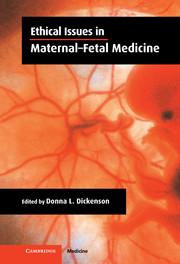Book contents
- Frontmatter
- Contents
- List of contributors
- Acknowledgements
- 1 Introduction: recent debates in maternal–fetal medicine – what are the ethical questions?
- 2 Overview: a framework for reproductive ethics
- I GENERIC ISSUES IN PREGNANCY
- 3 Multicultural issues in maternal–fetal medicine
- 4 HIV in pregnancy: ethical issues in screening and therapeutic research
- 5 Genetic screening: should parents seek to perfect their children genetically?
- 6 Is there a duty not to reproduce?
- 7 Between fathers and fetuses: the social construction of male reproduction and the politics of fetal harm
- 8 Restricting the freedom of pregnant women
- II INCEPTION OF PREGNANCY: NEW REPRODUCTIVE TECHNOLOGIES
- III FIRST AND SECOND TRIMESTER
- IV THIRD TRIMESTER
- V NEONATAL LIFE
- Index
5 - Genetic screening: should parents seek to perfect their children genetically?
from I - GENERIC ISSUES IN PREGNANCY
Published online by Cambridge University Press: 29 September 2009
- Frontmatter
- Contents
- List of contributors
- Acknowledgements
- 1 Introduction: recent debates in maternal–fetal medicine – what are the ethical questions?
- 2 Overview: a framework for reproductive ethics
- I GENERIC ISSUES IN PREGNANCY
- 3 Multicultural issues in maternal–fetal medicine
- 4 HIV in pregnancy: ethical issues in screening and therapeutic research
- 5 Genetic screening: should parents seek to perfect their children genetically?
- 6 Is there a duty not to reproduce?
- 7 Between fathers and fetuses: the social construction of male reproduction and the politics of fetal harm
- 8 Restricting the freedom of pregnant women
- II INCEPTION OF PREGNANCY: NEW REPRODUCTIVE TECHNOLOGIES
- III FIRST AND SECOND TRIMESTER
- IV THIRD TRIMESTER
- V NEONATAL LIFE
- Index
Summary
As the Human Genome Project nears completion, our knowledge about genes linked to human diseases and defects is growing at a dramatic rate. It is already possible to test embryos for several conditions at the pre-implantation stage (through pre-embryo biopsy) and to test fetuses for even more conditions during the course of their gestation (through amniocentesis, chorionic villus sampling and umbilical cord blood sampling) (Robertson, 1994: pp.155–60). At present, pre-implantation and prenatal screenings focus on severe genetic diseases (Strong, 1997: p. 137). In the near future, however, there will be increased ability to test for mild diseases, late-onset diseases, treatable diseases, propensities for common diseases, and even non-disease characteristics such as longevity, height and body-build (Strong, 1997: p. 137).
Although genetic knowledge of this type may strike us as an unalloyed blessing, ethicists worry that such information might fuel parents' increasing desire for perfect progeny. Up until very recently, parents could not do much to guarantee for themselves the child of their dreams. At most, if their moral views permitted, they could discard a pre-embryo or abort a fetus that tested positive for a relatively small range of genetic maladies, such as Tay–Sachs disease, Down's syndrome and Fragile X (Robertson, 1996).
- Type
- Chapter
- Information
- Ethical Issues in Maternal-Fetal Medicine , pp. 87 - 100Publisher: Cambridge University PressPrint publication year: 2002
- 1
- Cited by



